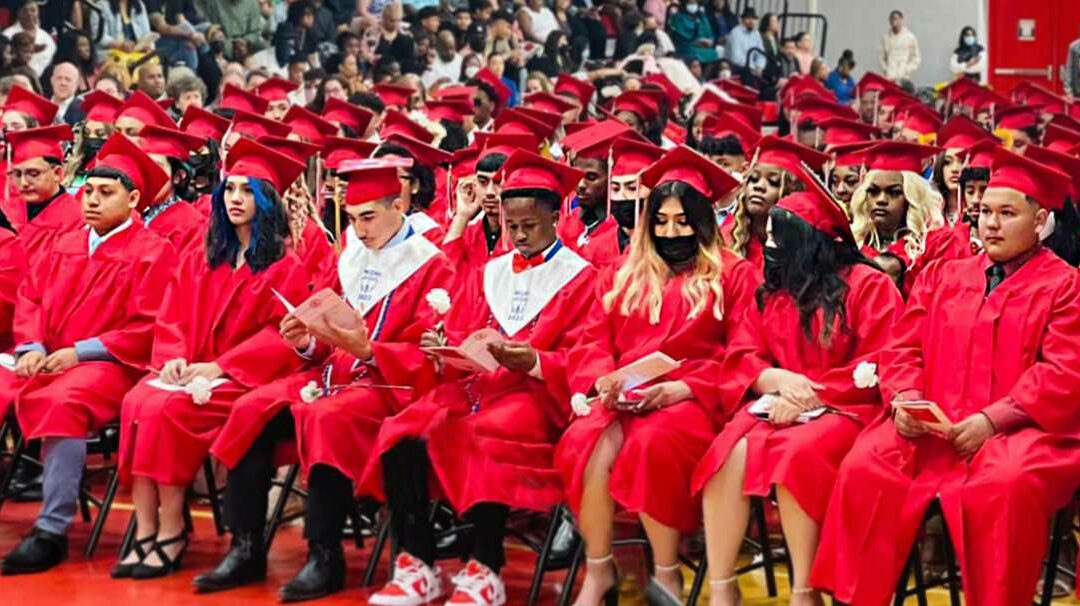Only three weeks into his second semester at North Chicago Community High School, 15-year-old Adrian had begun to slip. He missed English assignments, skipped his math homework, and earned a failing grade on a math exam.
Using a dashboard with real-time data on homework, tests, attendance, and behavior for every 9th-grader, the Student Success Team quickly flagged him for intervention.
That team—made up of teachers, counselors, and administrators—is the cornerstone of North Chicago Community High School’s Freshman On Track initiative, which includes a range of supports aimed at preventing course failure. Since launching the initiative in 2019, the school’s freshman pass rate has soared.
“It’s making a big difference,” said Adrian’s English teacher, Frances Turchinsky. “Nobody gets lost in the shuffle. We’re constantly having meetings, discussing red flags.”
Research has shown that a student’s likelihood of graduating high school can be strongly predicted by freshman year performance. For that reason, the state adopted a measure of 9th-grade progress called the Freshman On Track rate. Between 2018 and 2022, North Chicago’s Freshman On Track rate rose from 56 percent to over 90 percent.
And after launching Student Success Teams at every grade level, North Chicago’s graduation rate also made an astonishing leap from 56 percent in 2018 to 82 percent in 2022.
“They have a system that is designed for success--and not just minimal success--but huge success. It's just amazing to see the work that they've done."
Nicholas Heckel, a coordinator with the state’s school accountability and support system, said this about North Chicago Community High School. He was assigned to several years ago because its graduation rate was in the lowest five percent statewide. Now he sees the school as a model for others facing similar challenges.
A Comprehensive Support System
The system includes many supports, including some that reach every 9th-grader: A year-long Freshman Seminar teaches study skills and social-emotional skills like managing conflicts and goal setting. A first period study hall for all freshmen provides time to catch up on missed schoolwork, get extra help from classroom teachers, and participate in workshops on post-secondary planning. Freshmen also have smaller class sizes and weekly check-ins with the Freshman Seminar teacher about their school progress.
Other structures are aimed at providing more intensive support. Among others: A dedicated freshman counselor, who organizes the Student Success Team, and provides individual counseling. Teachers take turns covering a Student Success Center in the library, which provides tutoring during the school day.
Interventions for Adrian included visits to the Student Success Center and afterschool help from his teachers.
“They provide me a lot of help. They make me feel safe,” said Adrian, who ended the year on-track to graduate in 2025. “I always tell them, ‘Yeah, I felt like I could put in more effort.”
When Principal Lilith Werner first arrived at the high school in June 2018, she found a variety of well-intended programs for struggling students, but no comprehensive system to prevent failure school-wide. “It seemed very disjointed and was only hitting pockets of students,” she recalled. “Also we were not being data-driven or looking at the key levers that could improve success.”
Knowing that preventing course failure freshman year was one of those levers, she launched the Freshman On Track initiative in 2019 with support from The University of Chicago’s Network for College Success and funding from the Steans Family Foundation. Freshman teachers attended a summer institute and a consultant helped organize the first Student Success Team and provided ongoing coaching. “Our first focus was, ‘Let’s just get Freshman Academy right and we’ll figure out the rest,’” Werner said.
An Early Start
Tracking freshman progress begins even before the first day of school. Using data on student grades, attendance, and behavior sent from the middle school, the freshman counselor notes students at highest risk of course failure. The counselor then contacts those students and their families over the summer and invites them in for a visit.
“I tried to find out their strengths and what they’ve struggled with in the past,” said David Maya, who served as freshman counselor for the 2021-2022 school year. He then reviewed those findings with the Student Success Team at its first meeting of the school year. “There may be supports we can put in place right away,” he explained, such as counseling or tutoring.
With many struggling students, “if they are met with any sort of difficulty, they just stop, they don’t persevere,” observed David Raszkiewicz, a 9th-grade social studies teacher and success team member. “As a team, we identify these kids and work with them one-on-one to help them through things.”
One key to building students’ confidence and perseverance—and another core practice of the Freshman On Track initiative—is allowing kids to redo work and retake tests.
“It encourages them to come back and relearn material they didn’t understand the first time, rather than saying, ‘I failed my first test, I failed my second test, I’m just going to shut down for the year,’” explained Michael Dunning, a 9th-grade math teacher.
Fifteen-year-old Rosa, who was referred by the Student Success Team to counseling and tutoring, agrees. “I work harder when I get a chance to redo things,” she said. “Because I feel like the first time, I didn’t understand it, or I didn’t really want to do it. And then on the second try, I know I could do it. I can ask for more help.”
Now that the school is poised to make it out of the state’s accountability system, Principal Werner has set her sights even higher. She wants a system to support all students in achieving grades of “B” or better and increasing their extracurricular participation.
She’s proud of what the school has accomplished to date. “I think that everyone has done an outstanding job,” she said. “Everyone has a part to play in the success of our school. I think it’s exciting.”

